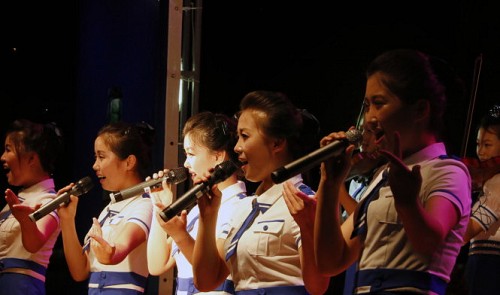Can you imagine men and women in North Korea, an isolated country, dancing merrily and gulping down draft beer at a fete?
“Tonight is the last day of the beer festival!” tour guide Choe Un Mi told the disbelieving Tuoi Tre (Youth) newspaper reporters right after their first dinner in the capital of Pyongyang during their recent trip to North Korea.
Around 8:00 pm, their tour bus stopped at Taedong Gate, the eastern gate of the inner castle in the walled city of Pyongyang, one of North Korea’s national treasures.
The illuminated gate is on the uphill stretch of Pyongchon Kangang Street and runs parallel to the Taedong River, one of the country’s largest.
Tickets cost two U.S. dollars or 15 Chinese yuan apiece.
At the entrance is a sign featuring a big glass of beer which visitors could pose with.
Nearby was a draft beer stall, where dozens of fair-skinned female waitresses in short skirts were standing with beaming smiles on.
The atmosphere was rousing with people going back and forth and pouring beer from the faucet.
There are seven varieties of beer, all called Taedonggang, which range from 50 won to 250 won per glass.
There were two stalls selling snacks to have with drinks.
The Tuoi Tre reporters elbowed their way through different areas to approach the stage, where gorgeous female singers were performing a song in unison.
From near the stage they got a panorama of the entire festival, which included two lines of wooden sheds with plastic covers, a cluster of round tables in the center and cemented tables with umbrellas.
All the areas were packed with festival goers.
Choe, the guide, showed the reporters around to find seats, but there were no unoccupied tables.
The group finally settled down at a cemented table under an umbrella, along with two middle-aged couples who were relishing their beer.
A group of eight boisterous, middle-aged women, who Choe introduced as civil servants of Pyongyang, were lounging at a table next to the reporters’.
Every time a song came up, the women all swung to the stirring music and performed traditional Korean dance movements.
They also asked the neighboring men to dance with them, creating a rowdy spectacle.
Two female members of the Tuoi Tre group were also asked to join the dances.
The musical performances were followed by a much-anticipated beer drinking competition, which involved three teams.
Two teams each had one male and one female member, while there were two men on another team.
The beer drinking competition happened after dialogue between the teams.
The women, either onstage or at the tables, were allowed to drink and clink their glasses as much as their male counterparts.
Leaving the fest in the best of moods, the Tuoi Tre journalists caught glimpses of several police officers keeping a strict watch outside the entrance.
Choe nodded her head at the police with a smile, knowing they would arrest drunk people staggering out from the festival.
The Taedonggang Pyongyang Beer Festival, which opened on August 20, served a variety of beers produced by Taedong Factory, including a brew made from rice and stout.
The Taedong beers are all certified for safety.
The natural underground water used to brew the malt is fetched from an unpolluted section of the Taedong River.
The salinity of the water source has also proven suitable for the brewing.
Buckwheat and rice come from South Hwanghae Province, the country’s granary.
Meanwhile the common hop widely used by the brewing industry is cultivated in Ryanggang Province, known internationally for the flowers grown in the organic farming model.
During their stay in North Korea, the Tuoi Tre reporters were fully aware of the shortage of common goods, particularly imported items.
During a breakfast served by the hotel, one member went for some coffee before he was seen getting in a row with a waiter.
He returned to the table empty-handed after a long while, adding that the waiter had asked him a lot of information, including the group’s room numbers and nationality.
The waiter had not allowed him to bring the coffee to their table either.
Around five minutes later, another row erupted between a Western tourist and the waiter for a similar reason.
The journalists later found out that during meals, coffee is the only imported drink and is not on the menu. Those who want coffee are charged separately.
On the train from Dandong, in southeastern Liaoning Province, along North Korea’s border with China in the Sinuiju Province, a search on the Chinese couple and others exposed a large number of ballpoint pens.
The pens would later be presented to children at a children’s center.
As the Tuoi Tre journalists did not have much on them, they gifted bags of noodles to the children just as they had brought relief to the four central Vietnamese provinces hit by the recent flooding.
























































